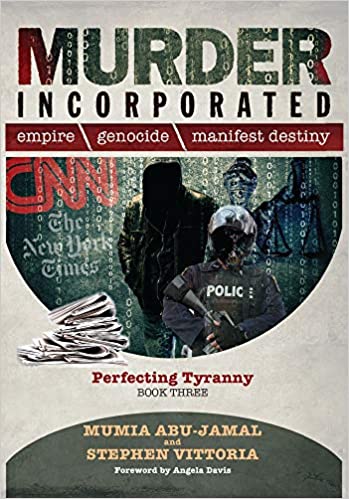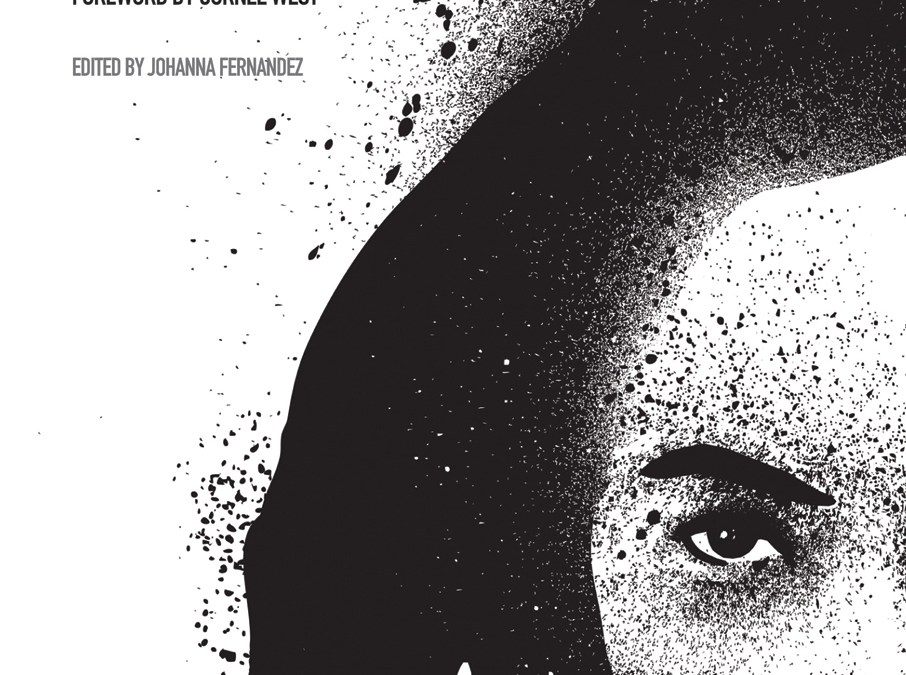
Murder, Incorporated: Empire, Genocide, Manifest Destiny.
Book Three: Perfecting Tyranny.
By Mumia Abu-Jamal and Stephen Vittoria. Foreword by Angela Y. Davis.
San Francisco: Prison Radio, 385 pp., $27.
Reviewed by Todd Steven Burroughs
THE ARC OF the radical universe is long, and Abu-Jamal and Vittoria are determined to extend it well into the 21st century by pointing out every aspect of American evil. But they refuse to make it sound like school, so they unapologetically attempt a Joe Cool. The third volume of their group of books on the American empire attempts to historically dissect and ideologically analyze all of the public institutions that make up a nation with the same initials as the old Union of South Africa: the U.S. Supreme Court, the mainstream news media, public campaigns such as the War on Drugs, and the institutional resistance to the people’s movements (Native American freedom, suffragists, Civil Rights/Black Power). In doing so, Abu-Jamal and Vittoria summarize their anti-hegemonic lives, leaving it all on the field at the end of Page 385.
The book was officially released the same week the American empire was under siege from its own white male supremacy foundation. Lives were lost and white property was damaged by clashes of agents of white supremacy, egged on by a white supremacist President, a Hela act to do without Klan masks. It’s one thing to read the story summary and another to catch the live show. (If there are any CDs of Hamilton left in America, they have surely been put away for good by now.) Trump’s naked white nationalism is the proof that this book series, published as Obama multi-racial optimism yielded first to Black Lives Matter marching and later to Trump’s torch flames, is relevant in all of its agit-prop glory.
Metaphorically, Abu-Jamal and Vittoria, often trading twelves like a Left radical equivalent of Albert Murray and Ralph Ellison, are two sole residents of a Leftist Gilligan’s Island (a snapshot that they might appreciate since this trilogy is filled with 20th-century pop-cult references), frantically waving banners for young people to stop and read. Unlike those perpetually-rerun castaways, they don’t want to be rescued; they want to be heard above the din of Disney+ and Instagram. So they curse, they enlarge fonts and they have subheads and title chapters that are part hilarious and always unforgettable. They want to win the battle of context and content, emphasizing both in ways they hope will stick.
So, then, Queen Victoria is described as the world’s greatest drug dealer, Martin Luther King is recalled from the Federal Bureau of Investigation lens as “the most dangerous Negro” in the United States, Fox News is referred to as The Cartoon Network and President Trump, “the 45th CEO of the United States,” is renamed “Fuckface von Clownstick.”
But in-between the humor and the name-calling is a Hela amount of America’s murderous and oppressive history, rocking back and forth through time like a bad TARDIS trip. On the history of U.S. surveillance: “Throughout American history, the pendulum has rocked between civil libertarians who embrace the actual language and spirit of the Fourth Amendment regarding the absolute necessity for probable cause along with a legitimate and very specific warrant—and the various government factions who continually attempt to stage-manage the Constitution with aggressive, warrantless surveillance.”
Like the old era of AM Top 40 radio, the hits keep on coming like its contemporary toy, Rock ‘Em Sock ‘Em Robots: the link they make between the billionaire Bill Gates and his buddy, the convicted sex-offender Jeffrey Epstein alone can raise almost any eyebrows. Whether the topic is Edward Snowden or the complex thoughts of U.S. Supreme Court Chief Judge Roger B. Taney as he took away as much humanity as he could from Native Americans and enslaved Africans, the history is well-researched, the analysis sharp, the language always beautiful and taut. (“Jazz broke out from its southern cradle, lighting then night skies of…”) After 26 years of Abu-Jamal’s books, it would be disappointing for any Abu-Jamal work to be otherwise, and he knows that. No matter how brief the Op-Ed or long the book, he has never written for the cheap seats of American intellectual consumption.
The greatest service the authors do is to make sure to emphasize that resistance to the Death Star is possible, profiling several of the activists of the ages, models of humaneness and courage such as Ella Baker and Emma Goldman. Democracy Now!’s Amy Goodman—who, it needs to be pointed out, once upon a time gave up one-third of her affiliates because she stood by Abu-Jamal and his “writes” to be on the air—gets huge shout-outs here for her old work; this book was clearly produced before or while she was in the middle of blotting out all alternatives to the Democratic Party and Joe Biden last year.

IF MUMA ABU-JAMAL had written only this trio, he’d be a late 20th-century and early 21st-century Leftist legend. But let’s roll call over the last 26 years:
- Live From Death Row
- Death Blossoms: Reflections From a Prisoner of Conscience
- All Things Censored (edited by Noelle Hanrahan)
- Faith Of Our Fathers: An Examination Of The Spiritual Life Of African And African-American People
- We Want Freedom: A Life In The Black Panther Party
- Jailhouse Lawyers: Prisoners Defending Prisoners V. The U.S.A
- The Classroom and The Cell: Conversations on Black Life in America (co-authored by Marc Lamont Hill)
- Writing on the Wall: Selected Prison Writings of Mumia Abu-Jamal (edited by Johanna Fernandez)
- Have Black Lives Ever Mattered?
- Murder Incorporated, Vol. 1
- Murder Incorporated, Vol. 2
That’s five Op-Ed/essay collections, one extended dialogue, two major scholarly works of historical narrative, a pioneering scholarly study of prison life, and now a series of gonzo-infused, Howard Zinn-like history. Twelve by this biographers’ count, all from prison, many from Death Row. This does not count the estimated two-score-plus books he has contributed to since 1993 as a foreword or afterword writer or contributing essayist.
To the sad state of Pennsylvania’s ever-grinding institutional teeth, Abu-Jamal is still alive and may write even more books, despite recent health challenges that have left him chronically ill. Ever-learning, he’s currently is working on his Ph.D. Thoth willing, more is coming.
How did this happen? It might have something to do with what Che Guevara once wrote: “(T)he true revolutionary is guided by strong feelings of love.” The modern “Free Mumia” movement was born in the Clinton era, when Noelle Hanrahan and Jane Henderson went to Huntington State Prison and recorded an inmate on Pennsylvania’s Death Row. They loved what they heard. But they also began to love who they heard. Between the three of them, that love was forged into a revolutionary weapon, for life (which happened to be the inmate’s religion).
Abu-Jamal was no stranger to love’s invisible strength: he loved his family, then the Philadelphia branch of the Black Panther Party, then the power of Black radio, then the Family Africa. Now he is loved and loves those who still protest in his name and those who speak and write for him, almost 40 years since that first jail door slammed. This book is published by Hanrahan, who has stood by him and has sacrificed for nearly 30 years to record him in solitary silence. She has done so steadfastly, when his cause was world-popular and when he was yesterday’s news. His co-author is his film biographer. Together, they are a trinity of radical commitment, with Abu-Jamal, his life of 67 years come April, and, most importantly, what they represent as its core.
So if 12 books published and translated around the world makes this fallible human being more than a mere legend, what should this man who long overcame his “cop killer” and “convicted-murderer” soundbite-tags be considered as now? Thinking about his role as cyberspace’s first political prisoner, with print and broadcast archives scattered all over the World Wide Web, a multi-thousand-word Wikipedia entry, YouTube and social media spaces for some of his estimated 2,000 Op-Eds and many interviews, and at least three documentary feature films, the only word this biographer can come up with after this trilogy, totaling 1,000 decolonized pages, is this one: immortal.
-30-
Todd Steven Burroughs, Ph.D., is an independent researcher and writer based in Newark, N.J. He recently completed a draft of Talking Drums and Raised Fists: Mumia Abu-Jamal, A Biography of a Voice and is working on a second Abu-Jamal book, a biographical anthology. He is the author of Warrior Princess: A People’s Biography of Ida B. Wells, and Marvel’s Black Panther: A Comic Book Biography, From Stan Lee to Ta-Nehisi Coates, both published by Diasporic Africa Press. His 2014 audiobook, Son-Shine On Cracked Sidewalks, deals with the first mayoral election of Ras Baraka, the son of the late activist and writer Amiri Baraka, in Newark.